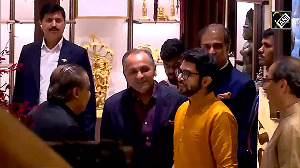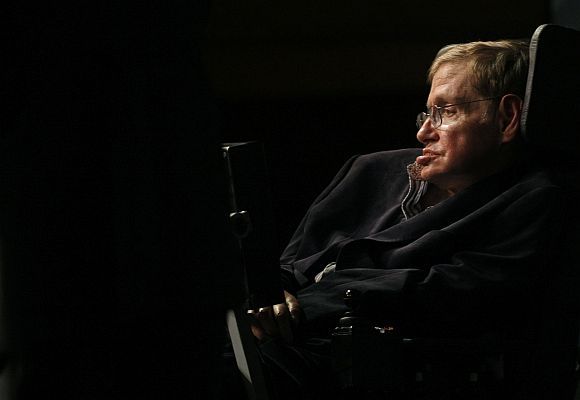
Image: File image of Stephen Hawking addressing a public meeting in Cape Town.
Photograph: Reuters.
On Wednesday, world-famous theoretical physicist and cosmologist Stephen Hawking passed away at the age of 76. Known as a brilliant mind in a paralysed body, he prided himself on making complex physical concepts accessible to the public, which he outlined in his bestseller, A Brief History of Time.
Even though Hawking, who was known for his contributions to the fields of cosmology and quantum gravity, especially in the context of black holes, did not receive a Nobel Prize, that doesn't undermine his humongous achievements.
In 2012 Rediff.com had published a feature on the rare aspects of Hawking’s life and work, based on an article by popular edutainment website HowStuffWorks, which we reproduce:
Hawking was a mediocre student in school
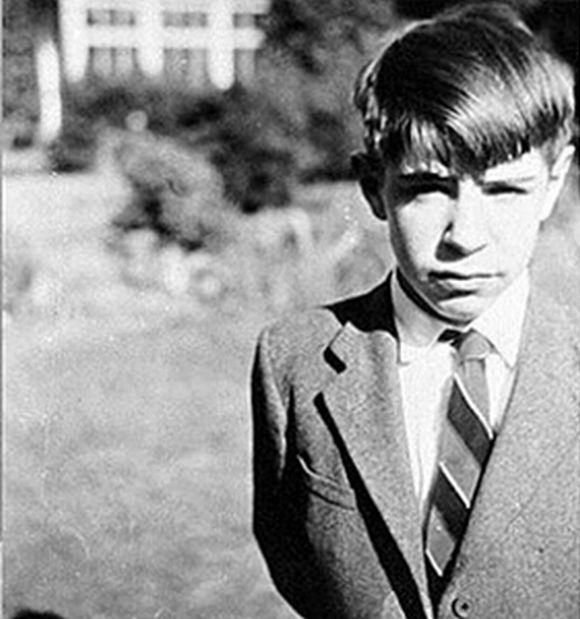
Image: An archival image of Stephen Hawking during his childhood days.
Photograph: Reuters
It may come as a shock to learn that Hawking was a slacker when it came to his school studies, the report notes.
In fact, when he was nine years old, his grades ranked among the worst in his class. With a little more effort, he brought those grades up to about average, but not much better.
Nevertheless, from an early age he was interested in how stuff worked. He has talked about how he was known to disassemble clocks and radios. However, he admits he wasn't very good at putting them back together so they could work again, the report adds.
Despite his poor grades, both his teachers and his peers seemed to understand that they had a future genius among them, evidenced by the fact that his nickname was "Einstein."
The problem with his mediocre grades was that his father wanted to send him to Oxford, but didn't have the money without a scholarship. Luckily, when it came time for the scholarship exams, he aced them, getting an almost perfect score on the physics exam, the report notes.
Hawking had an aversion for Biology
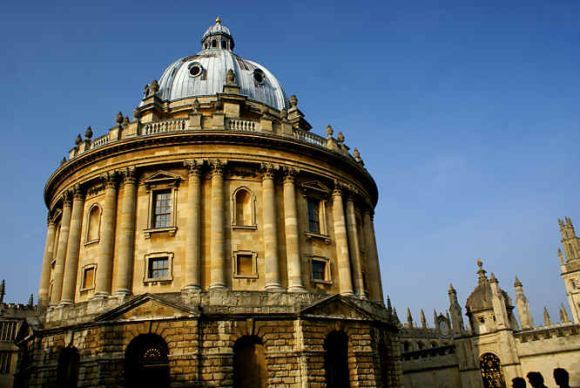
Image: A file image of Oxford University's Radcliffe Camera building. Hawking attended major in physics at Oxford, though he wanted to pursue in mathematics.
Photograph: Reuters
Hawking's father always wanted his son to study medicine, but he was more inclined towards mathematics from childhood days.
But, for all his interest in science, Stephen didn't care for biology. He has said that he found it to be "too inexact, too descriptive". He would have rather devoted his mind to more precise, well-defined concepts, the report states.
One problem, however, was that Oxford didn't have mathematics as a major. The compromise was that Stephen would attend Oxford and major in physics.
In fact, even within physics, he focused on the bigger questions. When faced with deciding between the two tracks of particle physics, which studies the behaviour of subatomic particles, versus cosmology, which studies the large universe as a whole, he chose the latter, the report adds.
Hawking was a member of Oxford rowing team
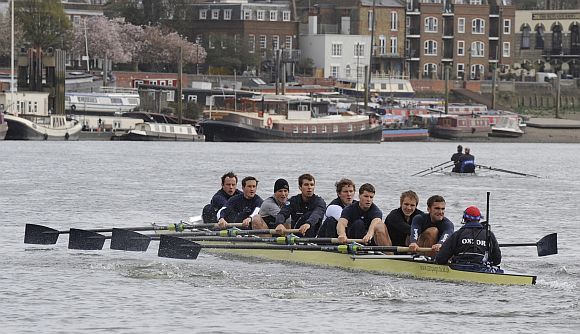
Image: File picture of Oxford University rowing team training on the River Thames in west London.
Photograph: Reuters
Biographer Kristine Larsen writes about how Hawking faced isolation and unhappiness during his first year or so at Oxford. The thing that seems to have drawn him out of this funk was joining the rowing team.
Even before being diagnosed with the illness that would eventually render him almost completely paralysed, Hawking didn't have what one would call a large or athletic build. However, row teams recruited smaller men like Hawking to be coxswains -- a position that does not row, but rather controls steering and stroke rate, the report states.
Because rowing was so important and competitive at Oxford, Hawking's role on the team made him very popular. Remembering Hawking from those days, one fellow boatsman called him "the adventurous type".
However, rigorous practice sessions affected his studies, and some times even Hawking used "creative analysis to create lab reports."
Hawking was told by doctors at 21 that he'll live for few years
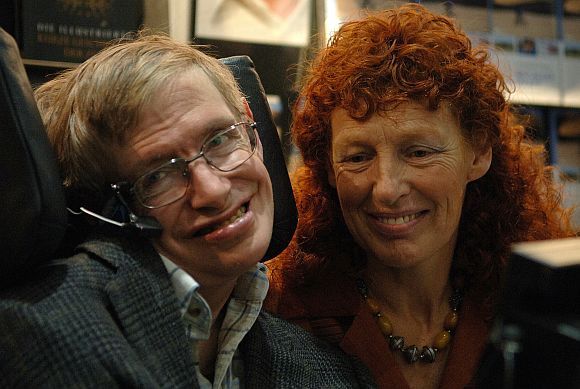
Image: Stephen Hawking and his wife Elaine visit the stand of German bookseller Rowohlt at the Frankfurt book fair.
Photograph: Reuters
As a graduate student, Hawking first started showing symptoms of general clumsiness. His family became concerned when he was home during his Christmas break from school and they insisted he see a doctor, the report notes.
Before seeing a specialist, however, he attended a New Year's Party where he met his future wife, Jane Wilde.
He turned 21 a week later, and shortly after he entered the hospital for two weeks of tests to discover what was wrong with him. He was then diagnosed with amyotrophic lateral sclerosis (ALS), also known as Lou Gehrig's disease, which is a neurological disease that causes patients to lose control of their voluntary muscles. He was told he'd probably only have a few years to live, the report says.
Hawking remembers being shocked and wondering why this happened to him. However, seeing a boy dying of leukemia in the hospital made him realize that there were others worse off than him.
Hawking became more optimistic and started dating Jane. They were soon engaged, and he cites their engagement as giving him "something to live for," the report adds.
Hawking helped create the boundless universe theory
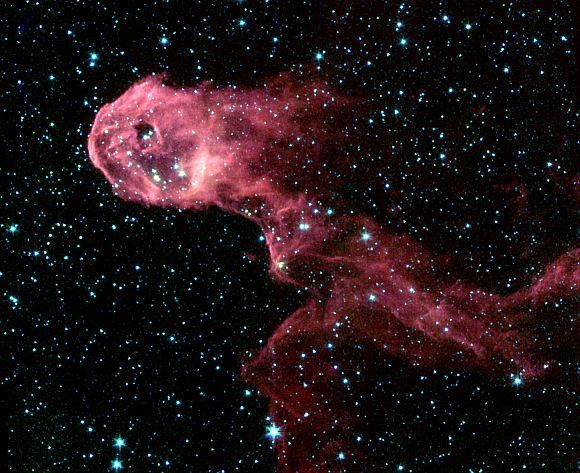
Photograph: Reuters.
One of Hawking's major achievements (which he shares with Jim Hartle) was to come up with the theory that the universe has no boundaries in 1983.
In 1983, the effort to understand the nature and shape of the universe, Hawking and Hartle combined the concepts of quantum mechanics (the study of the behaviour of microscopic particles) with general relativity (Einstein's theories about gravity and how mass curves space) to show that the universe is a contained entity and yet has no boundaries, the report notes.
Hawking lost a bet on black holes!
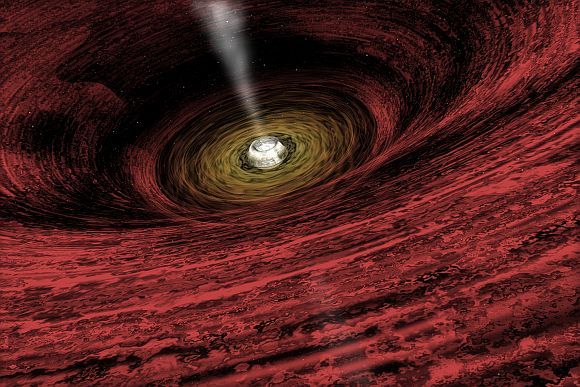
Image: A NASA illustration of a growing supermassive black hole.
Photograph: Reuters
In 2004, Hawking admitted he had been wrong and conceded a bet he made in 1997 with a fellow scientist about black holes.
Hawking had said at the time that information is lost in the black hole that eventually evaporates. The problem was that this idea that information is lost conflicted with the rules of quantum mechanics, creating what Hawking called an "information paradox."
American theoretical physicist John Preskill disagreed with this conclusion that information is lost in black hole. In 1997, he made a bet with Hawking saying that information can escape from them, thus not breaking the laws of quantum mechanics, the report states.
Hawking is such a good sport that he can admit when he's wrong -- which he did in 2004. While giving a lecture at a scientific conference, he said that because black holes have more than one "topology," and when one measures all the information released from all topologies, information isn't lost, the report adds.
Hawking has won numerous awards and distinctions
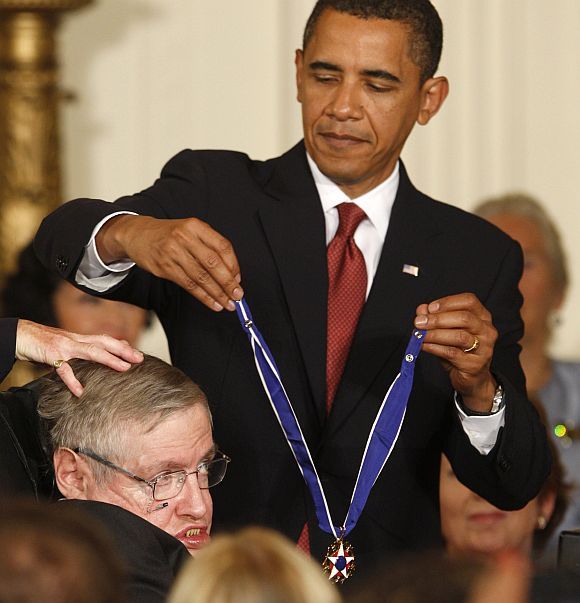
Image: Former US President Obama presents the medal of freedom to Stephen Hawking in Washington, DC.
Photograph: Reuters
In his long career in physics, Hawking had racked up an incredibly impressive array of awards and distinctions.
In 1974, he was inducted into the Royal Society (the royal academy of science in Britain, dating back to 1660), and a year later, Pope Paul VI awarded him and Roger Penrose the Pius XI Gold Medal for Science. He also went on to receive the Albert Einstein Award and Hughes Medal from the Royal Society, the report notes.
Hawking had so well established himself in the academic world by 1979 that he attained the post of Lucasian Professor of Mathematics at the University of Cambridge in England -- a position he would keep for the next 30 years. The chair dates all the way back to 1663, and the second person to hold it was none other than Sir Isaac Newton, the report notes.
In the 1980s, he was invested as a Commander of the British Empire, which is a rank in the UK just under being knighted. He also became a Companion of Honour, which is another distinction given in recognition of national service. There can no more than 65 members of the order at one time.
In 2009, Hawking was awarded the United States' highest civilian honour of the Presidential Medal of Freedom.
All the while, Hawking attained at least 12 honorary degrees.
Hawking also authored children's books
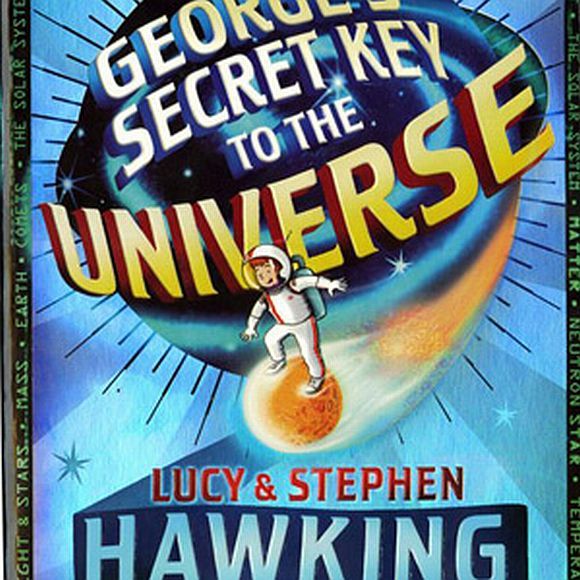
Image: The cover of George's Secret Key to the Universe.
Photograph: Reuters
Spring a surprise, in 2007, Stephen and his daughter, Lucy Hawking, collaborated to write 'George's Secret Key to the Universe.'
The book is a fiction story about a young boy, George, who rebels against his parents' aversion to technology. He begins to befriend neighbours, one of whom is a physicist with a computer. This turns out to be most powerful computer in the world, which offers portals to see and enter into outer space, the report notes.
The book was written to be the first of a trilogy that would continue George's adventures. The next one in the series came out in 2009 and is called 'George's Cosmic Treasure Hunt', the report adds.
Hawking believed in the possibility of alien life
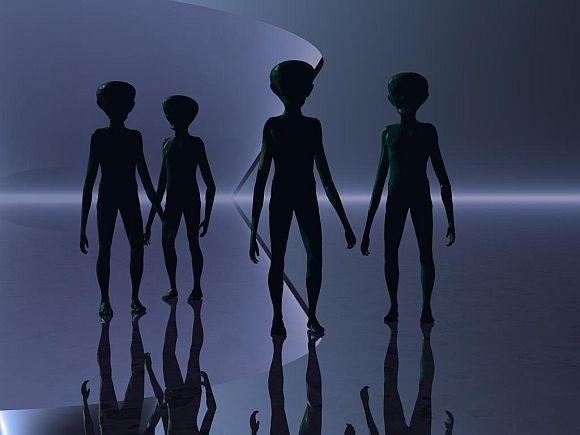
Photograph: Reuters
During NASA's 50th anniversary celebration in 2008, Hawking was invited to speak, and he mentioned his thoughts on the subject of possibility if alien life.
He expressed that, given the vastness of the universe, there very well could be primitive alien life out there, and it is possible, other intelligent life.
He went on the say that humans should be wary of exposure to aliens because alien life will probably not be DNA-based, and we would not have resistance to diseases, the report points out.
Hawking's 'zero gravity' flight to save human race
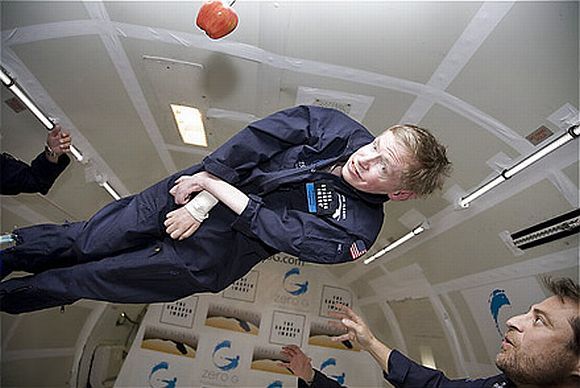
Image: Picture of Stephen Hawking taking a 'zero gravity' float without his wheelchair.
Photograph: Reuters
In 2007, Hawking got to take the ride of a lifetime. He was able to experience zero-gravity and float out of his wheelchair thanks to Zero Gravity Corp. The service involves an airplane ride in which sharp ascent and descent allows passengers to experience weightlessness in flight for several rounds, each about 25-seconds long, the report notes.
Hawking, free from his wheelchair for the first time in four decades, was even able to perform gymnastic flips. Hawking also has booked a seat with Richard Branson's Virgin Galactic to ride on a sub-orbital flight.
But perhaps most interesting about this is not what he was able to do, but why he did it. Due to the possibility of global warming or nuclear war, Hawking has said that the future of the human race, if it is going to have a long one, will be in outer space, the report says.
He supported private space exploration in hopes that space tourism will become affordable for the public. He hoped that we can travel to other planets to use their resources to survive, the report added.








